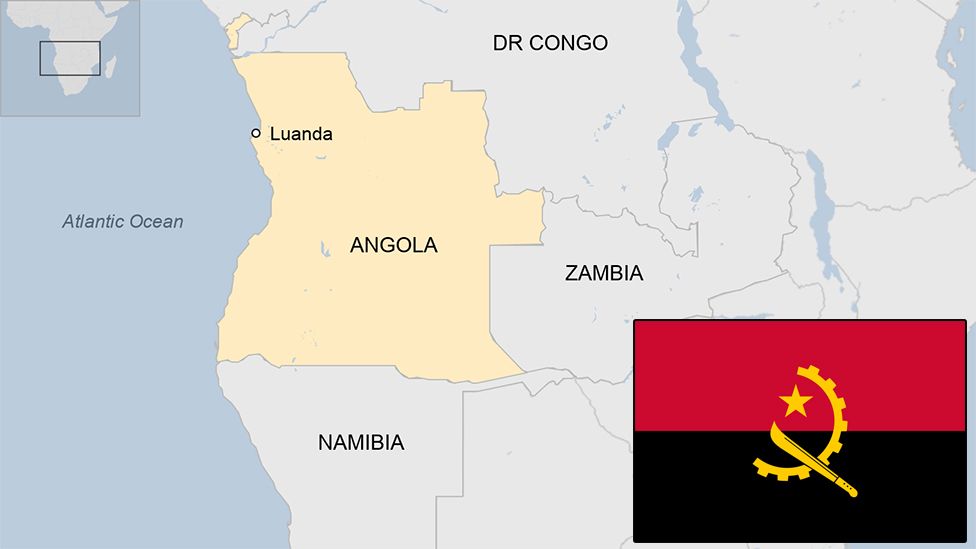Angola country profile
- Published

One of Africa's major oil producers, Angola is still tackling the physical, social and political legacy of a 27-year civil war that ravaged the country after independence.
Following Portugal's own revolution in 1974, and the subsequent withdrawal of its colonial administration in 1975, the rival former independence movements competed for power until 2002.
Angola has vast mineral and petroleum reserves, and its economy is among the fastest-growing in the world - but economic growth is highly uneven. Much of its oil wealth lies in its separate Cabinda province, where a decades-long separatist conflict simmers.
- Read more country profiles - Profiles by BBC Monitoring
REPUBLIC OF ANGOLA: FACTS
- Capital: Luanda
- Area: 1,246,700 sq km
- Population: 34.7 million
- Languages: Portuguese, also Kimbundu, Umbundu, Chokwe, Kikongo
- Life expectancy: 60 years (men) 65 years (women)
LEADER
President: Joao Lourenco
Joao Lourenco became the country's first new president in 38 years in September 2017.
He was the chosen candidate of his predecessor Jose Eduardo dos Santos, who did not run in the general election but who was still expected to retain a strong influence over the running of the country.
However, Mr Lourenco surprised many by firing several security chiefs close to his predecessor.
He also removed Isabel dos Santos, daughter of the former president, as head of the country's state oil company Sonangol. The former president's son, José Filomeno dos Santos, was sentenced for five years in jail for fraud and corruption in 2020.
Mr Lourenco is a retired general who first fought in the independence struggle against Portugal, and later against the National Union for the Total Independence of Angola (Unita) during the civil war.
MEDIA
State-owned media dominate the media landscape. Of the many privately owned newspapers that emerged following the advent of multiparty politics in 1992, only four still exist in print form.
"Censorship and control of information still weigh heavily on Angolan journalists," says the NGO, Reporters without Borders (RSF).
TIMELINE
Some key dates in Angola's history:
1300s - Kongo kingdom consolidates in the north.
1483 - Portuguese arrive.
16th-18th Centuries - Angola becomes a major Portuguese trading area for slaves. Between 1580 and 1680, more than one million people are enslaved and shipped to Brazil.
1836 - Slave trade officially abolished by the Portuguese government.
1956 - The early beginnings of the socialist guerrilla independence movement, the People's Movement for the Liberation of Angola (MPLA), based in northern Congo.
1950s-1961 - Nationalist movement develops, guerrilla war begins.
1961 - Forced labour abolished after revolts on coffee plantations leave 50,000 dead. The fight for independence is bolstered.
1974 - Revolution in Portugal, its colonial empire collapses.
1975 - Portuguese withdraw from Angola without formally handing power to any movement. MPLA is in control of Luanda and declares itself government of independent Angola. Unita and FNLA set up a rival government in Huambo.
1976 - MPLA gains upper hand.
1979 - MPLA leader Agostinho Neto dies. Jose Eduardo dos Santos takes over as president. He steps down 38 years later.
1987 - South African forces enter Angola to support Unita.
1988 - South Africa agrees to Namibian independence in exchange for removal of Cuban troops from Angola.
1991 - Government, Unita sign peace accord in Lisbon.
1992 - Disputed elections. Fighting flares again.
1998 - Luanda launches offensive against Unita - thousands killed in next four years of fighting.
2002 - Unita leader Jonas Savimbi is killed by government troops. The government and Unita sign a ceasefire shortly afterwards.
2004 - Oil production reaches one million barrels per day.
2012 - Angola launches a $5bn sovereign wealth fund to channel its oil wealth into investment projects.
2018 - Joao Lourenco becomes president.
- Published11 April 2023
- Published2 January
- Published13 February
- Published24 March 2023